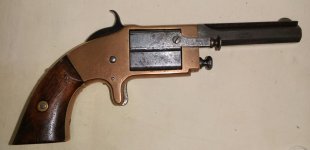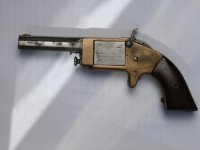I think it was more a matter of who was somehow able to make a workable-enough deal with Mr. White.
But here's the thing ... we don't have any evidence that anyone else was trying to make a deal with Rollin White. To the contrary; nobody (at least, nobody that we know of) cared a wit about his patent until Horace Smith and D. B. Wesson came up with the rimfire cartridge that necessitated the bored through cylinder. And it was only the happenstance of that necessity that made White's patent worth anything more than the paper it was printed on.
Others then wishing to produce Revolvers which would use Metallic Cartridges were then forced to be extorted by his accidental Patent for the Bored Through Cylinder.
I disagree that it was extortion.
Whether or not the bored through cylinder was the substance of his patent gets into a much more complex discussion about what a patent actually covers. But at that time, at least, the courts ruled that the bored through cylinder was a part of the patent, and that he was eligible to the legal protections that the patent offered.
(I suspect that modern courts would have made the same ruling—at least, insomuch as the bored through cylinder was a part of his "novel" invention.)
It's worth noting here that American patent laws (which differed pretty substantially from the European laws at the time) were part of why America became such a technological and economic powerhouse in the 19th century. The nuances of patent law have ebbed and flowed over time, of course, but the gist remains the same: there has to be some intrinsic reward for innovation. In the case of a patent, the trade is pretty straightforward: in exchange for putting the information in the public domain, the patentee gets a short-term monopoly on that innovation.
After years of royalties and lawsuits throughout the Civil War, Rollin White demanded an extension to his patent on the grounds that he was not sufficiently compensated for his invention! That's a documented fact. (Turns my stomach) Throughout the Civil War while people were dying he was busy in court suing any firm that manufactured a pistol to support the War effort having a bored through cylinder.
The royalties were more than consumed by the lawsuits that Rollin White was contractually obligated to pursue. We can argue after-the-fact that he should have known better, but that's not a good basis of judgment. And lots of companies sought patent extensions, and were granted them. In that sense, White was a bit of an exception to the rule.
And people died plenty of dying during the Civil War with the cap-and-ball muskets that the military was using at the time. I don't know that I buy into the idea that allowing the armories to manufacture cartridge load revolvers would have sped up the war or reduced the carnage. It's an interesting debate (like the question of Truman's decision to bomb Japan in WW2), but again—it's not a good foundation on which to judge Rollin White without a much more nuanced examination of the context.
A Civil War General definitely knew what he was talking about regarding the impact of superior weapons during war and the saving of lives.
This is the "appeal to authority" logical fallacy. Ulysseus Grant was a complex character, and one whose historical legacy remains in flux. That's another topic for another day, but suffice to say that Grant's disdain for Rollin White (Smith & Wesson, really), and his veto of the patent extension (which was granted by the Congress) wades deeply into the politics of the time.
Let's not make the mistake of jumping to overly simplistic conclusions that fit our narratives.
Mike



